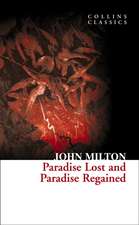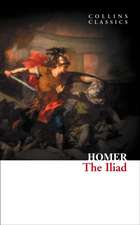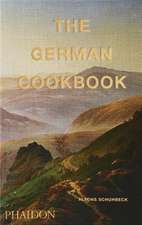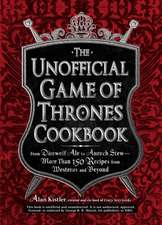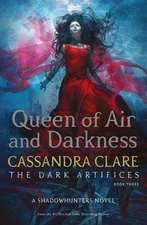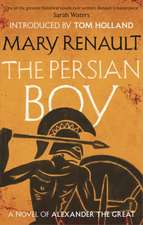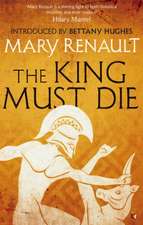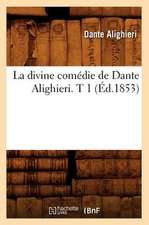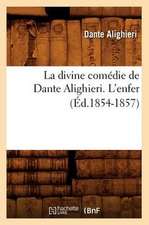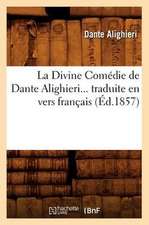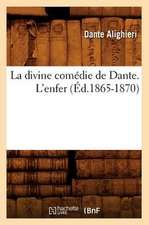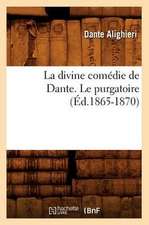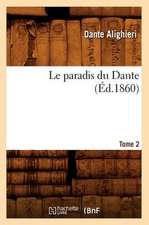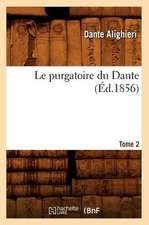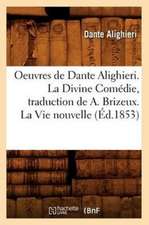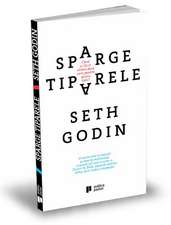Inferno: A New Verse Translation: Vintage Classics
Autor Dante Alighieri Traducere de Elio Zappullaen Limba Engleză Paperback – 30 sep 1999
Vezi toate premiile Carte premiată
ALA Notable Books (2013)
In this new rendition of a timeless classic, Italian scholar Elio Zappulla captures the majesty and enduring power of the Inferno, the first of the three canticles of Dante's The Divine Comedy, unarguably one of the masterpieces of world literature. Rendering Dante's terza rima into lyrical blank verse, Zappulla's translation makes accessible to the modern reader the journey of the famed Florentine poet Dante through the nine circles of hell. With Virgil at his side, the great poet descends through horrific landscapes of the damned--dark forests, boiling muck, and burning plains filled with unspeakable punishment, lamentation, and terror--depicted with gruesome detail unmatched in all literature. Richly annotated, this translation takes even the first-time reader on a truth-seeking journey whose imaginative and psychological discoveries make clear why this work persists at the heart of Western culture.
"If Dante's Inferno is a cautionary tale of the history of human depravity, it is also an amazingly complex narrative, treating timeless ethical themes, medieval philosophy and religion, tendentious political issues and deeply personal events."--San Diego Union-Tribune
| Toate formatele și edițiile | Preț | Express |
|---|---|---|
| Paperback (21) | 19.88 lei 3-5 săpt. | +5.83 lei 7-13 zile |
| HarperCollins Publishers – 4 mar 2025 | 19.88 lei 3-5 săpt. | +5.83 lei 7-13 zile |
| Penguin Random House Group – 8 oct 2009 | 37.18 lei 21-33 zile | |
| Bantam Books – 31 dec 1981 | 42.25 lei 3-5 săpt. | |
| CREATESPACE – | 43.74 lei 3-5 săpt. | |
| CREATESPACE – | 47.45 lei 3-5 săpt. | |
| CREATESPACE – | 48.45 lei 3-5 săpt. | |
| Modern Library – 30 sep 2005 | 50.32 lei 3-5 săpt. | |
| Arcturus Publishing – 15 iul 2018 | 50.52 lei 3-5 săpt. | +6.26 lei 7-13 zile |
| UNION SQUARE & CO – 7 mar 2023 | 54.25 lei 3-5 săpt. | +16.14 lei 7-13 zile |
| Alma Books COMMIS – 15 ian 2014 | 58.75 lei 3-5 săpt. | +14.00 lei 7-13 zile |
| CREATESPACE – | 68.92 lei 3-5 săpt. | |
| Mint Editions – 6 aug 2024 | 74.11 lei 3-5 săpt. | +7.30 lei 7-13 zile |
| KUPERARD (BRAVO LTD) – 2 mai 2004 | 75.86 lei 3-4 săpt. | |
| Aegypan Press – 31 mar 2008 | 107.11 lei 3-5 săpt. | |
| ODDNESS – 31 ian 2022 | 111.74 lei 3-5 săpt. | |
| Anchor Books – 31 dec 2001 | 114.85 lei 3-5 săpt. | |
| Hackett Publishing Company – 28 feb 2009 | 119.13 lei 3-5 săpt. | +29.99 lei 7-13 zile |
| Vintage Publishing – 30 sep 1999 | 119.66 lei 3-5 săpt. | |
| Graywolf Press – 2 sep 2013 | 124.78 lei 3-5 săpt. | |
| Hackett Publishing Company – 15 oct 2006 | 130.22 lei 3-5 săpt. | |
| Lulu.Com – 12 iul 2017 | 155.15 lei 6-8 săpt. | |
| Hardback (5) | 48.06 lei 3-5 săpt. | +24.57 lei 7-13 zile |
| CHARTWELL BOOKS – 14 dec 2021 | 48.06 lei 3-5 săpt. | +24.57 lei 7-13 zile |
| Quarto Publishing Group USA, Inc. – 28 noi 2024 | 81.93 lei 3-5 săpt. | +32.23 lei 7-13 zile |
| Mint Editions – 6 aug 2024 | 101.73 lei 3-5 săpt. | +12.31 lei 7-13 zile |
| Harvard University Press – 4 feb 1918 | 486.31 lei 3-5 săpt. | |
| Aegypan Press – 30 apr 2008 | 199.08 lei 6-8 săpt. |
Din seria Vintage Classics
- 12%
 Preț: 75.97 lei
Preț: 75.97 lei - 17%
 Preț: 52.35 lei
Preț: 52.35 lei -
 Preț: 88.88 lei
Preț: 88.88 lei - 17%
 Preț: 51.70 lei
Preț: 51.70 lei - 16%
 Preț: 53.83 lei
Preț: 53.83 lei - 16%
 Preț: 58.84 lei
Preț: 58.84 lei - 18%
 Preț: 51.14 lei
Preț: 51.14 lei - 16%
 Preț: 52.89 lei
Preț: 52.89 lei - 17%
 Preț: 51.79 lei
Preț: 51.79 lei - 17%
 Preț: 52.14 lei
Preț: 52.14 lei - 15%
 Preț: 54.35 lei
Preț: 54.35 lei - 17%
 Preț: 51.83 lei
Preț: 51.83 lei - 13%
 Preț: 56.71 lei
Preț: 56.71 lei - 24%
 Preț: 74.89 lei
Preț: 74.89 lei - 17%
 Preț: 52.70 lei
Preț: 52.70 lei - 17%
 Preț: 52.49 lei
Preț: 52.49 lei - 18%
 Preț: 56.49 lei
Preț: 56.49 lei - 25%
 Preț: 64.05 lei
Preț: 64.05 lei - 15%
 Preț: 60.02 lei
Preț: 60.02 lei - 18%
 Preț: 45.75 lei
Preț: 45.75 lei -
 Preț: 63.50 lei
Preț: 63.50 lei -
 Preț: 133.60 lei
Preț: 133.60 lei - 17%
 Preț: 52.33 lei
Preț: 52.33 lei -
 Preț: 110.32 lei
Preț: 110.32 lei - 17%
 Preț: 52.04 lei
Preț: 52.04 lei - 16%
 Preț: 53.59 lei
Preț: 53.59 lei -
 Preț: 101.80 lei
Preț: 101.80 lei - 14%
 Preț: 61.78 lei
Preț: 61.78 lei - 14%
 Preț: 72.12 lei
Preț: 72.12 lei - 17%
 Preț: 52.70 lei
Preț: 52.70 lei - 16%
 Preț: 80.68 lei
Preț: 80.68 lei - 16%
 Preț: 53.96 lei
Preț: 53.96 lei - 21%
 Preț: 55.80 lei
Preț: 55.80 lei - 16%
 Preț: 53.53 lei
Preț: 53.53 lei - 17%
 Preț: 52.70 lei
Preț: 52.70 lei -
 Preț: 81.13 lei
Preț: 81.13 lei - 12%
 Preț: 41.29 lei
Preț: 41.29 lei - 17%
 Preț: 57.06 lei
Preț: 57.06 lei - 16%
 Preț: 52.95 lei
Preț: 52.95 lei - 14%
 Preț: 72.63 lei
Preț: 72.63 lei - 18%
 Preț: 51.16 lei
Preț: 51.16 lei - 23%
 Preț: 53.46 lei
Preț: 53.46 lei -
 Preț: 96.67 lei
Preț: 96.67 lei -
 Preț: 109.71 lei
Preț: 109.71 lei -
 Preț: 133.42 lei
Preț: 133.42 lei -
 Preț: 98.78 lei
Preț: 98.78 lei - 14%
 Preț: 61.94 lei
Preț: 61.94 lei - 18%
 Preț: 40.46 lei
Preț: 40.46 lei - 17%
 Preț: 51.70 lei
Preț: 51.70 lei
Preț: 119.66 lei
Nou
Puncte Express: 179
Preț estimativ în valută:
22.90€ • 23.91$ • 18.95£
22.90€ • 23.91$ • 18.95£
Carte disponibilă
Livrare economică 14-28 martie
Preluare comenzi: 021 569.72.76
Specificații
ISBN-13: 9780679757085
ISBN-10: 0679757082
Pagini: 336
Ilustrații: 15 ILLUSTRATIONS THROUGHOUT
Dimensiuni: 132 x 203 x 18 mm
Greutate: 0.3 kg
Editura: Vintage Publishing
Seria Vintage Classics
ISBN-10: 0679757082
Pagini: 336
Ilustrații: 15 ILLUSTRATIONS THROUGHOUT
Dimensiuni: 132 x 203 x 18 mm
Greutate: 0.3 kg
Editura: Vintage Publishing
Seria Vintage Classics
Recenzii de la cititorii Books Express
Ioana Andreia Sandru a dat nota:
It was rather hard to understand it and so I read it twice. The second time reading it was more enjoyable because I understood the poem better, and that helped me appreciate the power of imagination and creativity. Inferno is undoubtedly one of the masterpieces in epic poetry.
Ioana Andreia Sandru a dat nota:
It was rather hard to understand it and so I read it twice. The second time reading it was more enjoyable because I understood the poem better, and that helped me appreciate the power of imagination and creativity. Inferno is undoubtedly one of the masterpieces in epic poetry.
Notă biografică
Elio Zappullo lives in Stony Brook, New York.
Extras
Nel mezzo del cammin di nostra vita
mi ritrovai per una selva oscura,
che la diritta via era smarrita.
Ahi quanto a dir qual era è cosa dura4
esta selva selvaggia e aspra e forte
che nel pensier rinova la paura!
Tant' è amara che poco è più morte;7
ma per trattar del ben ch'i' vi trovai,
dirò de l'altre cose ch'i' v'ho scorte.
Io non so ben ridir com' i' v'intrai,10
tant' era pien di sonno a quel punto
che la verace via abbandonai.
Ma poi ch'i' fui al piè d'un colle giunto,13
là dove terminava quella valle
che m'avea di paura il cor compunto,
guardai in alto e vidi le sue spalle16
vestite già de' raggi del pianeta
che mena dritto altrui per ogne calle.
Allor fu la paura un poco queta,19
che nel lago del cor m'era durata
la notte ch'i' passai con tanta pieta.
E come quei che con lena affannata,22
uscito fuor del pelago a la riva,
si volge a l'acqua perigliosa e guata,
Canto One
Lost in a dark wood and threatened by three beasts, Dante is rescued by Virgil, who proposes a journey to the other world.
Midway upon the journey of our life
I found myself in a dark wilderness,
for I had wandered from the straight and true.
How hard a thing it is to tell about,4
that wilderness so savage, dense, and harsh,
even to think of it renews my fear!
It is so bitter, death is hardly more-7
but to reveal the good that came to me,
I shall relate the other things I saw.
How I had entered, I can't bring to mind,10
I was so full of sleep just at that point
when I first left the way of truth behind.
But when I reached the foot of a high hill,13
right where the valley opened to its end-
the valley that had pierced my heart with fear-
I raised my eyes and saw its shoulders robed16
with the rays of that wandering light of Heaven°
that leads all men aright on every road.
That quieted a bit the dread that stirred19
trembling within the waters of my heart
all through that night of misery I endured.
And as a man with labored breathing drags22
his legs out of the water and, ashore,
fixes his eyes upon the dangerous sea,
° that wandering light of Heaven: Italian pianeta, "planet." It is the sun, considered a planet, or wandering light, revolving about the earth.
così l'animo mio, ch'ancor fuggiva,25
si volse a retro a rimirar lo passo
che non lasciò già mai persona viva.
Poi ch'èi posato un poco il corpo lasso,28
ripresi via per la piaggia diserta,
sì che 'l piè fermo sempre era 'l più basso.
Ed ecco, quasi al cominciar de l'erta,31
una lonza leggera e presta molto,
che di pel macolato era coverta;
e non mi si partia dinanzi al volto,34
anzi 'mpediva tanto il mio cammino,
ch'i' fui per ritornar più volte vòlto.
Temp' era dal principio del mattino,37
e 'l sol montava 'n sù con quelle stelle
ch'eran con lui quando l'amor divino
mosse di prima quelle cose belle;40
sì ch'a bene sperar m'era cagione
di quella fiera a la gaetta pelle
l'ora del tempo e la dolce stagione;43
ma non sì che paura non mi desse
la vista che m'apparve d'un leone.
Questi parea che contra me venisse46
con la test' alta e con rabbiosa fame,
sì che parea che l'aere ne tremesse.
Ed una lupa, che di tutte brame49
sembiava carca ne la sua magrezza,
e molte genti fé già viver grame,
questa mi porse tanto di gravezza52
con la paura ch'uscia di sua vista,
ch'io perdei la speranza de l'altezza.
E qual è quei che volontieri acquista,55
e giugne 'l tempo che perder lo face,
che 'n tutti suoi pensier piange e s'attrista;
tal mi fece la bestia sanza pace,58
che, venendomi 'ncontro, a poco a poco
mi ripigneva là dove 'l sol tace. So too my mind, while still a fugitive,25
turned back to gaze again upon that pass
which never let a man escape alive.
When I had given my weary body rest,28
I struck again over the desert slope,
ever the firmer foot the one below,
And look! just where the steeper rise began,31
a leopard light of foot and quick to lunge,
all covered in a pelt of flecks and spots,
Who stood before my face and would not leave,34
but did so check me in the path I trod,
I often turned to go the way I came.
The hour was morning at the break of dawn;37
the sun was mounting higher with those stars°
that shone beside him when the Love Divine
In the beginning made their beauty move,40
and so they were a cause of hope for me
to get free of that beast of flashy hide-
The waking hour and that sweet time of year;43
but hope was not so strong that I could stand
bold when a lion stepped before my eyes!
This one seemed to be coming straight for me,46
his head held high, his hunger hot with wrath-
seemed to strike tremors in the very air!
Then a she-wolf, whose scrawniness seemed stuffed49
with all men's cravings, sluggish with desires,
who had made many live in wretchedness-
So heavily she weighed my spirit down,52
pressing me by the terror of her glance,
I lost all hope to gain the mountaintop.
And as a gambler, winning with a will,55
happening on the time when he must lose,
turns all his thoughts to weeping and despair,
So I by that relentless beast, who came58
against me step by step, and drove me back
to where the sun is silent evermore.
those stars: the constellation Aries. It is the springtime of the year, recalling the springtime of the universe; see notes. Mentre ch'i' rovinava in basso loco,61
dinanzi a li occhi mi si fu offerto
chi per lungo silenzio parea fioco.
Quando vidi costui nel gran diserto,64
«Miserere di me», gridai a lui,
«qual che tu sii, od ombra od omo certo!».
Rispuosemi: «Non omo, omo già fui,67
e li parenti miei furon lombardi,
mantoani per patrïa ambedui.
Nacqui sub Iulio, ancor che fosse tardi,70
e vissi a Roma sotto 'l buono Augusto
nel tempo de li dèi falsi e bugiardi.
Poeta fui, e cantai di quel giusto73
figliuol d'Anchise che venne di Troia,
poi che 'l superbo Ilïón fu combusto.
Ma tu perché ritorni a tanta noia?76
perché non sali il dilettoso monte
ch'è principio e cagion di tutta gioia?».
«Or se' tu quel Virgilio e quella fonte79
che spandi di parlar sì largo fiume?»,
rispuos' io lui con vergognosa fronte.
«O de li altri poeti onore e lume,82
vagliami 'l lungo studio e 'l grande amore
che m'ha fatto cercar lo tuo volume.
Tu se' lo mio maestro e 'l mio autore,85
tu se' solo colui da cu' io tolsi
lo bello stilo che m'ha fatto onore.
Vedi la bestia per cu' io mi volsi;88
aiutami da lei, famoso saggio,
ch'ella mi fa tremar le vene e i polsi».
«A te convien tenere altro vïaggio»,91
rispuose, poi che lagrimar mi vide,
«se vuo' campar d'esto loco selvaggio;
ché questa bestia, per la qual tu gride,94
non lascia altrui passar per la sua via,
ma tanto lo 'mpedisce che l'uccide;
Now while I stumbled to the deepest wood,61
before my eyes appeared the form of one
who seemed hoarse, having held his words so long.
And when I saw him in that endless waste,64
"Mercy upon me, mercy!" I cried out,
"whatever you are, a shade, or man in truth!"
He answered me: "No man; I was a man,67
and both my parents came from Lombardy,
and Mantua they called their native land.
In the last days of Julius I was born,70
and lived in Rome under the good Augustus
in the time of the false and cheating gods.
I was a poet, and I sang of how73
that just son of Anchises° came from Troy
when her proud towers and walls were burnt to dust.
But you, why do you turn back to such pain?76
Why don't you climb that hill that brings delight,
the origin and cause of every joy?"
"Then are you-are you Virgil? And that spring79
swelling into so rich a stream of verse?"
I answered him, my forehead full of shame.
"Honor and light of every poet, may82
my long study avail me, and the love
that made me search the volume of your work.
You are my teacher, my authority;85
you alone are the one from whom I took
the style whose loveliness has honored me.
See there the beast that makes me turn aside.88
Save me from her, O man renowned and wise!
She sets the pulses trembling in my veins!"
"It is another journey you must take,"91
replied the poet when he saw me weep,
"if you wish to escape this savage place,
Because this beast that makes you cry for help94
never lets any pass along her way,
but checks his path until she takes his life.
From the Hardcover edition.
mi ritrovai per una selva oscura,
che la diritta via era smarrita.
Ahi quanto a dir qual era è cosa dura4
esta selva selvaggia e aspra e forte
che nel pensier rinova la paura!
Tant' è amara che poco è più morte;7
ma per trattar del ben ch'i' vi trovai,
dirò de l'altre cose ch'i' v'ho scorte.
Io non so ben ridir com' i' v'intrai,10
tant' era pien di sonno a quel punto
che la verace via abbandonai.
Ma poi ch'i' fui al piè d'un colle giunto,13
là dove terminava quella valle
che m'avea di paura il cor compunto,
guardai in alto e vidi le sue spalle16
vestite già de' raggi del pianeta
che mena dritto altrui per ogne calle.
Allor fu la paura un poco queta,19
che nel lago del cor m'era durata
la notte ch'i' passai con tanta pieta.
E come quei che con lena affannata,22
uscito fuor del pelago a la riva,
si volge a l'acqua perigliosa e guata,
Canto One
Lost in a dark wood and threatened by three beasts, Dante is rescued by Virgil, who proposes a journey to the other world.
Midway upon the journey of our life
I found myself in a dark wilderness,
for I had wandered from the straight and true.
How hard a thing it is to tell about,4
that wilderness so savage, dense, and harsh,
even to think of it renews my fear!
It is so bitter, death is hardly more-7
but to reveal the good that came to me,
I shall relate the other things I saw.
How I had entered, I can't bring to mind,10
I was so full of sleep just at that point
when I first left the way of truth behind.
But when I reached the foot of a high hill,13
right where the valley opened to its end-
the valley that had pierced my heart with fear-
I raised my eyes and saw its shoulders robed16
with the rays of that wandering light of Heaven°
that leads all men aright on every road.
That quieted a bit the dread that stirred19
trembling within the waters of my heart
all through that night of misery I endured.
And as a man with labored breathing drags22
his legs out of the water and, ashore,
fixes his eyes upon the dangerous sea,
° that wandering light of Heaven: Italian pianeta, "planet." It is the sun, considered a planet, or wandering light, revolving about the earth.
così l'animo mio, ch'ancor fuggiva,25
si volse a retro a rimirar lo passo
che non lasciò già mai persona viva.
Poi ch'èi posato un poco il corpo lasso,28
ripresi via per la piaggia diserta,
sì che 'l piè fermo sempre era 'l più basso.
Ed ecco, quasi al cominciar de l'erta,31
una lonza leggera e presta molto,
che di pel macolato era coverta;
e non mi si partia dinanzi al volto,34
anzi 'mpediva tanto il mio cammino,
ch'i' fui per ritornar più volte vòlto.
Temp' era dal principio del mattino,37
e 'l sol montava 'n sù con quelle stelle
ch'eran con lui quando l'amor divino
mosse di prima quelle cose belle;40
sì ch'a bene sperar m'era cagione
di quella fiera a la gaetta pelle
l'ora del tempo e la dolce stagione;43
ma non sì che paura non mi desse
la vista che m'apparve d'un leone.
Questi parea che contra me venisse46
con la test' alta e con rabbiosa fame,
sì che parea che l'aere ne tremesse.
Ed una lupa, che di tutte brame49
sembiava carca ne la sua magrezza,
e molte genti fé già viver grame,
questa mi porse tanto di gravezza52
con la paura ch'uscia di sua vista,
ch'io perdei la speranza de l'altezza.
E qual è quei che volontieri acquista,55
e giugne 'l tempo che perder lo face,
che 'n tutti suoi pensier piange e s'attrista;
tal mi fece la bestia sanza pace,58
che, venendomi 'ncontro, a poco a poco
mi ripigneva là dove 'l sol tace. So too my mind, while still a fugitive,25
turned back to gaze again upon that pass
which never let a man escape alive.
When I had given my weary body rest,28
I struck again over the desert slope,
ever the firmer foot the one below,
And look! just where the steeper rise began,31
a leopard light of foot and quick to lunge,
all covered in a pelt of flecks and spots,
Who stood before my face and would not leave,34
but did so check me in the path I trod,
I often turned to go the way I came.
The hour was morning at the break of dawn;37
the sun was mounting higher with those stars°
that shone beside him when the Love Divine
In the beginning made their beauty move,40
and so they were a cause of hope for me
to get free of that beast of flashy hide-
The waking hour and that sweet time of year;43
but hope was not so strong that I could stand
bold when a lion stepped before my eyes!
This one seemed to be coming straight for me,46
his head held high, his hunger hot with wrath-
seemed to strike tremors in the very air!
Then a she-wolf, whose scrawniness seemed stuffed49
with all men's cravings, sluggish with desires,
who had made many live in wretchedness-
So heavily she weighed my spirit down,52
pressing me by the terror of her glance,
I lost all hope to gain the mountaintop.
And as a gambler, winning with a will,55
happening on the time when he must lose,
turns all his thoughts to weeping and despair,
So I by that relentless beast, who came58
against me step by step, and drove me back
to where the sun is silent evermore.
those stars: the constellation Aries. It is the springtime of the year, recalling the springtime of the universe; see notes. Mentre ch'i' rovinava in basso loco,61
dinanzi a li occhi mi si fu offerto
chi per lungo silenzio parea fioco.
Quando vidi costui nel gran diserto,64
«Miserere di me», gridai a lui,
«qual che tu sii, od ombra od omo certo!».
Rispuosemi: «Non omo, omo già fui,67
e li parenti miei furon lombardi,
mantoani per patrïa ambedui.
Nacqui sub Iulio, ancor che fosse tardi,70
e vissi a Roma sotto 'l buono Augusto
nel tempo de li dèi falsi e bugiardi.
Poeta fui, e cantai di quel giusto73
figliuol d'Anchise che venne di Troia,
poi che 'l superbo Ilïón fu combusto.
Ma tu perché ritorni a tanta noia?76
perché non sali il dilettoso monte
ch'è principio e cagion di tutta gioia?».
«Or se' tu quel Virgilio e quella fonte79
che spandi di parlar sì largo fiume?»,
rispuos' io lui con vergognosa fronte.
«O de li altri poeti onore e lume,82
vagliami 'l lungo studio e 'l grande amore
che m'ha fatto cercar lo tuo volume.
Tu se' lo mio maestro e 'l mio autore,85
tu se' solo colui da cu' io tolsi
lo bello stilo che m'ha fatto onore.
Vedi la bestia per cu' io mi volsi;88
aiutami da lei, famoso saggio,
ch'ella mi fa tremar le vene e i polsi».
«A te convien tenere altro vïaggio»,91
rispuose, poi che lagrimar mi vide,
«se vuo' campar d'esto loco selvaggio;
ché questa bestia, per la qual tu gride,94
non lascia altrui passar per la sua via,
ma tanto lo 'mpedisce che l'uccide;
Now while I stumbled to the deepest wood,61
before my eyes appeared the form of one
who seemed hoarse, having held his words so long.
And when I saw him in that endless waste,64
"Mercy upon me, mercy!" I cried out,
"whatever you are, a shade, or man in truth!"
He answered me: "No man; I was a man,67
and both my parents came from Lombardy,
and Mantua they called their native land.
In the last days of Julius I was born,70
and lived in Rome under the good Augustus
in the time of the false and cheating gods.
I was a poet, and I sang of how73
that just son of Anchises° came from Troy
when her proud towers and walls were burnt to dust.
But you, why do you turn back to such pain?76
Why don't you climb that hill that brings delight,
the origin and cause of every joy?"
"Then are you-are you Virgil? And that spring79
swelling into so rich a stream of verse?"
I answered him, my forehead full of shame.
"Honor and light of every poet, may82
my long study avail me, and the love
that made me search the volume of your work.
You are my teacher, my authority;85
you alone are the one from whom I took
the style whose loveliness has honored me.
See there the beast that makes me turn aside.88
Save me from her, O man renowned and wise!
She sets the pulses trembling in my veins!"
"It is another journey you must take,"91
replied the poet when he saw me weep,
"if you wish to escape this savage place,
Because this beast that makes you cry for help94
never lets any pass along her way,
but checks his path until she takes his life.
From the Hardcover edition.
Descriere
Descriere de la o altă ediție sau format:
"Abandon all hope, ye who enter here"readthe now-famous words above the gate through which Dante, the protagonist of Inferno, crosses the threshold. But that forbidding inscription applies only to those without faith; and though Dante's journey through the nine circles of Hellbegins withterror and confusion.
"Abandon all hope, ye who enter here"readthe now-famous words above the gate through which Dante, the protagonist of Inferno, crosses the threshold. But that forbidding inscription applies only to those without faith; and though Dante's journey through the nine circles of Hellbegins withterror and confusion.
Recenzii
An attractive new alternative as both a translation and a pedagogical tool. The volume includes an excellent introduction by Dante scholar Steven Botterill (Univ. of California, Berkeley), clear and informative notes by lifelong Dantist Anthony Oldcorn, a concise bibliographical note that indicates some important sources on Dante in print and online, and a diagram of Hell; Index of the Damned lists characters who appear in the canticle. The translator's preface explains Lombardo's choices as he faced the always-challenging task of rendering Dante's poetry into English. Among the most interesting choices are the occasional use of rhyme--especially in key passages and at the end of each canto, where interlocking rhymes that mimic Dante's terza rima are consistently employed--and an emphasis on creating a version that works well as an oral presentation, following the long tradition of private, public, and theatrical readings of the poem. The volume includes the original Italian text, thus facilitating classroom references and comparisons. --Rebecca West (Department of Romance Languages and Literatures, University of Chicago) in Choice
I deeply admired Lombardo's translations of Iliad and Odyssey , as did my students--they were universally complimentary, loving the way the poetry flowed, and many of them learned the habit of reading the text aloud, much to the astonishment of their classmates from other sections of the courses. But their encounter with his Inferno was of a different order, as was mine. Lombardo's Inferno is so knowledgeable of the translation tradition (which it uses to marvelous effect), so poetically well-crafted, so compelling to read, so well-documented without overwhelming the reader, that I simply did not want to put it down. My students had much the same reaction. Although in the first session they were responsible for only the first third of the book, I quickly noticed that most of them had already read it through. They found it compelling to read and were captivated by a journey to which many of them had the week before said they did not look forward. --Ted Humphrey, Barrett Professor in the Barrett Honors College, Arizona State University
"This newest verse translation offered by Stanley Lombardo artfully carries into English the radical vernacularity, both linguistic and cultural, of Dante's Inferno. Readers and teachers who want a text that will resonate with contemporary and colloquial American English would do well to choose this translation. Lombardo's translation revels in the street music of Dante's vernacular poetry and occasional vulgar style in the Inferno. At times the interaction between Dante's stock devils, the Malebranche, sounds like the dialogue in a Scorsese film. Lombardo performs other poetic feats so that Dante's poetry might stand out in English with the same vitality with which Dante infused his vernacular poem. Lombardo finishes every canto with a brief interlocked rhymed passage to give the reader a taste of Dante's terza rima. He also shifts into rhyme for Dante's diatribes. As Lombardo aptly points out in his preface, style and meaning must cohere if the art of the poet is to resurface in a translation, and the forcefulness of his translation allows Dante's harsh poetry to carry through. The volume contains various helpful tools for the reader to understand the Inferno, both as an expression of the medieval intellect and as a cornerstone of the European literary tradition, and provides ample headnotes, prepared by veteran Dante scholar Anthony Oldcorn, to each canto. Neither a simple summary nor a detailed gloss, the notes do provide narrative signposts while giving a feel for the myriad ethical, philosophical, and poetical themes that Dante confronts. The eminent Dante scholar Steven Botterill provides a masterly introduction to the Inferno that grounds the poem in Dante's Italy while refraining from dwelling on unnecessary detail. Botterill organizes the introduction into themes rather than offering a vita auctoris. The novice reader of Dante will learn the important facts of Dante's life without having ever read the word Guelph or Ghibelline. Instead, Botterill emphasizes Dante as a vernacular poet and the radical invention of his poem. Similarly, the endnotes, by Oldcorn, opt for brevity and elegance over the exhaustive apparatus that accompanies many editions of the Commedia Oldcorn covers Dante's fundamental literary genealogies while paying attention to his place in the Western tradition. This translation aims to bring Dante to a new audience of readers who are unfamiliar with Dante and the Italian tradition in general." --Jason M. Houston, Speculum
I deeply admired Lombardo's translations of Iliad and Odyssey , as did my students--they were universally complimentary, loving the way the poetry flowed, and many of them learned the habit of reading the text aloud, much to the astonishment of their classmates from other sections of the courses. But their encounter with his Inferno was of a different order, as was mine. Lombardo's Inferno is so knowledgeable of the translation tradition (which it uses to marvelous effect), so poetically well-crafted, so compelling to read, so well-documented without overwhelming the reader, that I simply did not want to put it down. My students had much the same reaction. Although in the first session they were responsible for only the first third of the book, I quickly noticed that most of them had already read it through. They found it compelling to read and were captivated by a journey to which many of them had the week before said they did not look forward. --Ted Humphrey, Barrett Professor in the Barrett Honors College, Arizona State University
"This newest verse translation offered by Stanley Lombardo artfully carries into English the radical vernacularity, both linguistic and cultural, of Dante's Inferno. Readers and teachers who want a text that will resonate with contemporary and colloquial American English would do well to choose this translation. Lombardo's translation revels in the street music of Dante's vernacular poetry and occasional vulgar style in the Inferno. At times the interaction between Dante's stock devils, the Malebranche, sounds like the dialogue in a Scorsese film. Lombardo performs other poetic feats so that Dante's poetry might stand out in English with the same vitality with which Dante infused his vernacular poem. Lombardo finishes every canto with a brief interlocked rhymed passage to give the reader a taste of Dante's terza rima. He also shifts into rhyme for Dante's diatribes. As Lombardo aptly points out in his preface, style and meaning must cohere if the art of the poet is to resurface in a translation, and the forcefulness of his translation allows Dante's harsh poetry to carry through. The volume contains various helpful tools for the reader to understand the Inferno, both as an expression of the medieval intellect and as a cornerstone of the European literary tradition, and provides ample headnotes, prepared by veteran Dante scholar Anthony Oldcorn, to each canto. Neither a simple summary nor a detailed gloss, the notes do provide narrative signposts while giving a feel for the myriad ethical, philosophical, and poetical themes that Dante confronts. The eminent Dante scholar Steven Botterill provides a masterly introduction to the Inferno that grounds the poem in Dante's Italy while refraining from dwelling on unnecessary detail. Botterill organizes the introduction into themes rather than offering a vita auctoris. The novice reader of Dante will learn the important facts of Dante's life without having ever read the word Guelph or Ghibelline. Instead, Botterill emphasizes Dante as a vernacular poet and the radical invention of his poem. Similarly, the endnotes, by Oldcorn, opt for brevity and elegance over the exhaustive apparatus that accompanies many editions of the Commedia Oldcorn covers Dante's fundamental literary genealogies while paying attention to his place in the Western tradition. This translation aims to bring Dante to a new audience of readers who are unfamiliar with Dante and the Italian tradition in general." --Jason M. Houston, Speculum
Textul de pe ultima copertă
This timeless Christian allegory has become the key with which Western civilization has sought to unlock the mystery fo its own identity. In the Inferno, the first of the Comedy's three parts, Dante is conducted by the spirit of the classical poet Virgil through the nine circles of Hell on the initial stage of his arduous journey toward God.
Premii
- ALA Notable Books Winner, 2013


